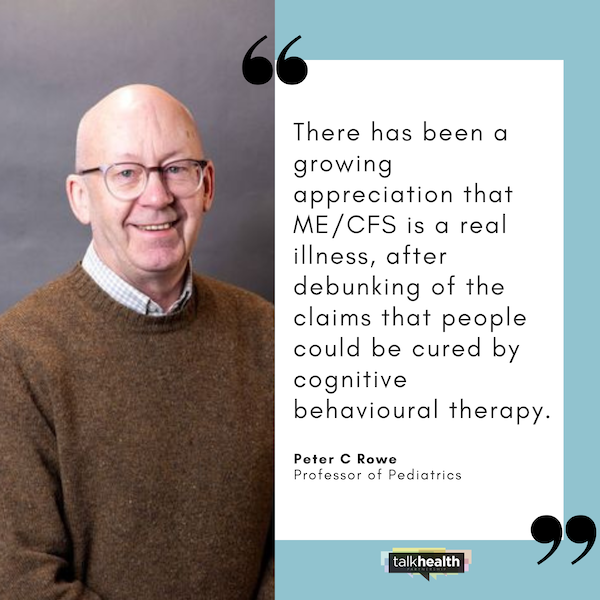talkhealth meets... Dr Peter Rowe

Dr Peter Rowe is an expert in all things ME and chronic fatigue. In his Expert Interview, he shed light on orthostatic intolerance – the feeling of light headedness and dizzyness when standing up.
Here, he shares more about ME and CFS, and some of the other side effects of the chronic condition.
Read on to learn more...
In relation to the conditions of ME/CFS, are more people being diagnosed due to increased awareness and an enhanced understanding of ME/CFS? If so, are there any physiological factors that may be contributing, or is it purely a result of greater awareness?
There has been a growing appreciation that ME/CFS is a real illness, after some debunking of the claims that people could be cured by cognitive behavioural therapy. Evidence over the past 30 years has shown that sufferers have physiological differences, including heart rate, blood pressure, and brain blood flow when they are upright. This evidence argues against the outdated view that the illness is linked to psychological causes. Having a reduced brain blood flow is the cause of symptoms such as fatigue and difficulty concentrating, commonly seen in ME/CFS.
Are more women than men diagnosed with ME/CFS? If so, what are the potential reasons behind this?
More women than men develop ME/CFS, but we do not know all the reasons for this. One possible reason is that women have a lower blood pressure on average than men. Women are more likely to develop a rapid heart rate when upright than men, also known as Postural Tachycardia Syndrome (PoTS), which can also be associated with ME/CFS and reduced brain blood flow when upright. Women also have looser connective tissue and joint hyper-mobility than men, both of which have been shown to be a risk factor for ME/CFS. Another possibility is that women are more likely to develop auto-immune diseases and generally have a different immune response to infections than men.
Aside from conventional medical treatments that may be offered to sufferers of ME/CFS, are there any alternative therapies or treatments that could possibly assist in symptom alleviation?
For symptoms such as Orthostatic Intolerance in ME/CFS, a higher salt intake, keeping hydrated and wearing compression garments can all help blood return to the heart. Liquorice root is sometimes used to increase blood pressure, but is less effective than prescription medications. Supplements are available which can improve blood return to the heart when people are upright but these are often used to treat varicose veins, rather than ME/CFS. Other supplements can treat specific symptoms, such as Vitamin B2, Magnesium and Co-Enzyme Q10 for migraines. Epsom bath salts can be effective at treating muscle pain. Despite the various alternative treatments, there is not much formal proof that these products work.
However, there is some published evidence in support of other supplements, such as injectable Vitamin B12 and oral curcumin in ME/CFS. Medical journals acknowledge that the quality of the science is not the best in this area, also that there is little risk of causing harm. Other potential treatments for symptoms of ME/CFS include vagal nerve stimulators, but more studies are needed.
Is there anything one could do to potentially prevent the onset of ME/CFS?
We don’t know the answer, mainly because not all the biological factors that go into developing ME/CFS are understood. But in the times of COVID, the best protection against not suffering from post-COVID ME/CFS is not to get infected. The next best protection is to get the COVID vaccine.
In which direction do you envisage medical research going in the future, in terms of ME/CFS?
I think we will see more genetic research into the risk factors for ME/CFS, as it’s not uncommon for more than one member of a family to develop the illness. Understanding how joint hyper-mobility affects the risk of ME/CFS is also an important task because those with a diagnosis of ME/CFS have a 3-fold increase in the chances that their joints are hyper-mobile. More research needs to be done to find out how this physical trait relates to the increased risk of ME/CFS, and why some people often don’t develop the illness until adolescence or young adulthood. Although the onset of ME/CFS is common after a virus, further research will help in finding out how the response of the immune system can lead to developing ME/CFS. With the amount of research being done on long COVID, some of those findings will be relevant to how we best treat ME/CFS.
Information contained in this Articles page has been written by talkhealth based on available medical evidence. The content however should never be considered a substitute for medical advice. You should always seek medical advice before changing your treatment routine. talkhealth does not endorse any specific products, brands or treatments.
Information written by the talkhealth team
Last revised: 10 January 2025
Next review: 10 January 2027
